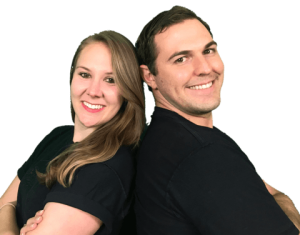Denis O’Brien [0:37]
Welcome to Episode 176 – Real estate on your terms.
Hey Money Clan, a very warm welcome to the Chain of Wealth podcast. I’m your host Denis O’Brien.
Katie Welsh [0:49]
And I’m Katie Welsh.
Denis O’Brien [0:50]
So Katie real estate- an area that we haven’t dived into in quite a while on Chain of Wealth?
Katie Welsh [0:56]
Well, yeah, and I really found this interesting because I feel like this is something that we like me and you could really take advantage of.
Denis O’Brien [1:5]
Yeah, hundred perc ent. And I think a lot of our listeners as well, they’re sort of figuring out that first step towards buying their own property, or maybe looking at an investment property or whatever else it is. And I really thought that Chris had a great idea. And he has a great product, and he offers a lot of good information about how you can achieve it. And even if you don’t have great credit, this is an option for you.
Katie Welsh [1:26]
Yes. And I feel like a lot of times when you don’t have great credit you can you like your hands are tied and you don’t know what to do. And there’s a an alternative and a work around that you can kind of get your feet wet and get your feet in the game.
Denis O’Brien [1:38]
Yeah. So if you guys haven’t already, we are onboarding people for our debt destruction course. We’re actually giving away five sponsorships. If you’d be interested in signing up for course, head on over to chainofwealth.com/debtcourse. We would love to read about your debt story, what you’re currently dealing with how you hate life or whatever else it is.
Katie Welsh [1:59]
Well we wouldn’t love it.
Denis O’Brien [2:0]
We wouldn’t love it. I wouldn’t get a kick out of it.
Katie Welsh [2:2]
We want to help you.
Denis O’Brien [2:4]
But I’d love to hear like how you’re trying to pay off debt and how we can try and help you. Yes, definitely check that off. Alright Kate, you ready to dive in?
Katie Welsh [2:12]
Yes.
Denis O’Brien [2:12]
Fantastic. Let’s do it.
Chris Prefontaine is the best selling author of Real Estate on Your Terms, a real estate investor with over 27 years experience in the field. Chris is the founder of Smart Real Estate Coach and host of the Smart Real Estate Coach podcast. He lives in Newport, Rhode Island with his wife Kim and their family. Chris and his family co authored the book, New Rules of Real Estate Investing that was just released on May 14 of 2019. Chris has been a big advocate of constant education. He and his family mentor, coach consult and actually partner with students across the country, teaching them exactly what their company does. Chris and his family believe strongly in giving back to the community. They currently support multiple charities.
Chris Prefontaine [3:17]
Hey, thanks for having me on, guys.
Katie Welsh [3:19]
Yeah, so you have had quite an extensive career in real estate. But how did you get your start?
Chris Prefontaine [3:25]
I actually started in the early 90s, doing some spot building. In other words, infill subdivisions, just doing one house at a time. And that led to buying a realty executives franchise and 95 ish. We sold that to Cole banker in 2000 started coaching people throughout US and Canada right around then as well as doing our own investments. So from 2000, till all the way through to the crash, we’re doing our own investments and coaching.
Katie Welsh [3:52]
Oh, wow, that’s really interesting. So with all that experience, you probably have come across a lot of people who are buying their first home, I imagine.
Chris Prefontaine [4:2]
Yeah, I mean, we get it from a commercial standpoint, but we also get it because we deal with with buyers helping them get into their first home, especially if they can’t qualify conventionally. So you’ve got about it varies, but about 80% of the market right now. The buyer pool, they can’t walk in a bank and get a loan. That’s a big number. The banks have just made it. Yeah, the rates are low, but they’ve made it tighter and tighter and tighter with their restraints on how to get that loan. And so the rent to own vehicle works great for me. That’s how we we exit most of our homes, all of our homes.
Katie Welsh [4:32]
Yeah. So what advice do you have for somebody like something pivotal that, you know, you’re going in buying your first home? What is something that you must know, in your opinion?
Chris Prefontaine [4:43]
The banking process can be grueling, frankly, I mean, I’m in the business. And I considered to be grueling. So if their credit is not pristine, don’t worry, because again, that’s 80% of you listening. So if the credit is not pristine, there is a pathway to enhance that and grow, increase that score over time and grow your down payment over time, you can do a rent own otherwise known as a lease purchase for your first home. And that way you can you don’t have to wait until you save up. But you don’t have to wait until your credit’s better. You can lock something in now and not have to chase the market while you’re renting.
Denis O’Brien [5:15]
So how does the rent own, well, how does the method really work? You’re obviously a renting it, but like what sort of is the timeframe? And like, Is this some sort of like a balloon payments or something? How does it exactly work?
Chris Prefontaine [5:27]
Yeah, so from the buying side standpoint, they would go through a little bit of a qualification process not to see how high the credit is, because usually, we assume it’s not great yet. But it’s to see can they afford it income wise debt, debt to income wise, and so we’re setting them up to win not to have a, you know, a headache, or a failure in two or three years. And the term is typically three years. But it ranges from like two to seven, but it’s real good average is three years. So what happens is they stop paying a lease payment, they do put down a down payment. So they have skin in the game, they are acting like they are treated like they pay for bills like they own the home. So everything is just as if they own it, including locking in the price only, they don’t have a mortgage yet. And so at the end of that term, because they went through our credit enhancement program, because they went through a program to get mortgage ready, they’re going to go ahead and get their own financing at that point. And so could be, you know, somewhere between month 24 and 36, they will get a conventional mortgage with the help of the program in cash out the property, then they not only do everything already said, but they have their own mortgage now.
Denis O’Brien [6:31]
So who typically owns the property before that point.
Chris Prefontaine [6:35]
It’s sometimes us as the investor or you know, we have students around the country to do the same thing. Or the deed sits in the seller’s name. And we are doing a lease with them and a lease at the same time with the buyer. That’s called the sandwich lease.
Katie Welsh [6:50]
Okay, and what if you’re young, like you’re a young family, and you do have pretty good credit. And when I say pretty good, I say anything between like 740 and up, I think there’s pretty good credit. That’s great. Yeah, yeah. What if you have good credit, but you just don’t have the money for a down payment? right away? Is there any kind of fast track for that? How would that work?
Chris Prefontaine [7:15]
Okay, so two different things there. If they don’t mind what their mortgage will]be, in other words- they say, okay, I have none or 1% down. First time buyer programs do offer that in many states, many state almost all states for first time buyer. But they may say, Well, that’s great, I can qualify for that. But I don’t want that high of a mortgage payment. Therefore I want to save up. By the time they save up the market could appreciate past them. So then the same rent to own vehicle would work. Because they have great credit, they could type the property on the rent own while they’re in the property they could save for another two years, but still walking the price has a great way for them to get in as well. And frankly, there’s a great buyers, for us as investors because we know the credits already there. They just need some time.
Katie Welsh [7:56]
That’s interesting. I feel like that route is often not really understood very often. So I’m glad that you touched on.
Chris Prefontaine [8:3]
No, I agree.
Katie Welsh [8:4]
Yeah, it’s not talked about.
Denis O’Brien [8:8]
So what would you say are some common mistakes that you see people making when buying their first home?
Chris Prefontaine [8:13]
Probably going that last question, you asked me about no money down? So someone might qualify for that. But are they taking on too much repayment? You know, yes, you qualify. But you because you put nothing down? Can you actually afford it? Or is that going to cramp your lifestyle?
Katie Welsh [8:27]
Okay, and how much I know, putting down I think it’s 20%? You avoid PMI? Which is mortgage insurance.
Chris Prefontaine [8:36]
Right?
Katie Welsh [8:36]
Can you talk a little bit about the importance of putting down 20% to avoid the the mortgage insurance and how that really can affect home owning experience?
Chris Prefontaine [8:49]
Well, yeah, well, you blowing that you really blowing the money that you’re paying for that because that’s going to cost you It depends on the price range, right. But it’s going to cost anywhere from, say, $150 $200, up to $1,000 a month, if you go into high end home. And so it’s just a total waste should never going to get rid of that until such time you have 20% equity in the home. And most people forget about that 2,3,4 or five years later, when they might have the equity, then you have to go ahead and submit that to the bank. And it’s not reapplying all over again, it’s not that bad. But you do have to have appraisal done and other proof that you’ve got that equity back in there. So you just wasted money for several years, if not the course of the entire loan that can add up.
Katie Welsh [9:25]
So definitely, if possible, try to have the 20% down when you’re putting the down payment on your house.
Chris Prefontaine [9:31]
Yeah, and if they don’t just go the rent to own route with us, you’re not you’re not losing anything at all. If you can find a house you like on the rent own program, because you locking it in just like you own it price and all and so you can capture equity about time, two or three years ago, not only did you save up more, but you have more equity in the property already.
Denis O’Brien [9:48]
So in the rent own with that 20% does that sort of still apply? Because you don’t technically own the property at that point.
Chris Prefontaine [9:56]
So what they’ll do, Denis, is this is if this is what the question was, they’ll come in with, we require a minimum of 3%. And all if a 10%, 3% will get them in the door. And then they’ll have they’ll have a payment plan that might be linked to tax refunds every year. So every February, it’s a big time where a lot of them February, March, a lot of them are pointing down extra money from the tax refunds. Some have quarterly bonuses at work, they’ll put those on the plan. So they’ll be on the planemeeting, they’ll go ahead and put extra deposits down. So at the very end, they’ve built that up to the 20 but this start like that, but they built it up to the 20.
Denis O’Brien [10:31]
And the rent to own model as well, if you want to start looking into having more than one property and start looking at investment properties, can that still apply? Could you still structure something like that?
Chris Prefontaine [10:40]
Well, yeah, so that’s the avenue we teach. So we teach investors around the country exactly what we’re talking about right now to go out and do this as investors. So between our own properties and properties we we do with students around the country, we do anywhere between 5 and 10 a month of this type of transaction. So on the set on the buying side, it looks like what as an investor, you would type the property on a lease purchase contract none of your own money, no bank loans, no signing personally. And then you would go ahead and with your right to sublease put a rent to own tenant buyer in there. But in doing that, as an investor you not only you’re not using your own cash or credit, you’re creating three distinct paydays. And these paydays are important because any business can use these timing of these one is cash right away up front, like when you put a tenant buyer in the home, you’re collecting a non refundable deposit payment that’s payday one. Each month when you pay the mortgage payment or the seller or whoever the arrangement is, as an investor, you then collecting higher than that from the tenant buyer, obviously. So that’s a spread of several hundred dollars per month per house. And then payday three is at the very end when they close it out. There’s a you know, obviously the mock up in the house that you profited from. So those three paydays can be super profitable. Even if someone wants to go out and do one a year nevermind one or two a month.
Denis O’Brien [11:55]
Cool so, would you say that there’s any real noticeable difference between buying a home that’s going to be loving and versus that investment property?
Chris Prefontaine [12:2]
Well, yeah, because it’s not an emotional or personal taste issue at that point. It’s all it’s just numbers, right? So if I look at a property, it doesn’t matter if I’d like to live in it matters what the numbers are, is it does have enough bedrooms, is it in good condition? Has it been maintained? And so is it going to fit the investment, you know, protocol versus personal taste.
Katie Welsh [12:20]
Okay, so right before we wrap into our value linking round, I wanted to hear your 30 second elevator pitch about Real Estate on Your Terms
Chris Prefontaine [12:31]
Sure, so Real Estate on Your Terms, piggybacks what I just said regarding not jeopardizing your credit your cash or your personal assets. And if you want to dive deeper into that without spending any money, I’ll give you a free link for the Amazon best selling hardcover book, real estate on your terms. And you can just go to freesrecbook.com. When I say free, you don’t have to put a credit card in for shipping either like most of them, that’s a free, so this is totally free will ship it at our expense. And then with that, you’ll actually get a free strategy call with me as well, if that’s what you desire.
Katie Welsh [13:8]
That’s awesome. I think it’s really helpful when you’re able to get a book and you see it like in your hands and you can highlight it and make notes and everything. And then if they’re able to give you a call and ask any kind of questions, that is definitely helpful. Because this is something that I think is really interesting.
Denis O’Brien [13:26]
Yeah. And like really anyone you know, like has need for real estate, like you have to live somewhere. Right? So I would say the most sort of education you can get on the topic. Definitely the better off you are
Katie Welsh [13:36]
For sure.
Chris Prefontaine [13:37]
Well, yeah, there’s a huge gap in the industry between doing that and then actually doing deals. And that’s where we differentiate ourselves. So it’s all it’s all in the family. We’re all we’re locking arms with these students and doing deals all over the country not just going here has a product or is it book, you know, actually get some deals done.
Katie Welsh [13:52]
Yeah.
Denis O’Brien [13:53]
Great Money Clan, we’re just going to take a quick break and then we’ll dive right back into the value link round.
Katie Welsh [13:58]
Hey, Den, I recently started using the Great Courses Plus to learn all kinds of topics, but my favorite has been money management skills. I found it particularly useful learning about the psychology of money now they’ve been able to pay off my student loan.
Denis O’Brien [14:15]
Kate, I’ve really enjoyed this course as well. And there’s the finance expert Michael Finke. Also, dived into some topics that really interest me such as the pros and cons of homeownership credit, or cash, stocks and mutual funds. He really goes into a lot of depth and helps you really understand stuff, the great courses, has recently partnered with Chain of Wealth, and we’re presenting a special offer to our audience. And that’s a free month of access to their library of over 11,000 videos. If you’d like to claim your free offer, head on over to TheGreatCoursesPlus.com/wealth. That’s TheGreatCoursesPlus.com/Wealth
Katie Welsh [14:56]
Okay, Chris, so I can kind of have an idea of what your retirement plan looks like. But can you share a little bit with us what your savings and retirement plan looks like?
Chris Prefontaine [15:7]
Yeah, so ours is all property if you can, for obvious reasons it’s what we do, it’s what we’ve done forever. Yeah, let’s just take one property. For example, when you talk about that subject, you can do any one of these properties in a self directed IRA. So picture that so you can take a property on the street, paydays can average anywhere from 45,000 to 110,000, around the country, as is like, right, the middle like 75. So you put down a $10 or $100 deposit from your self directed IRA. And then over the next three years, in comes the unlimited profit potential of anywhere from 45 to 110k and so you can grow that tax free. That’s pretty big issue for people to retire with.
Katie Welsh [15:46]
Yeah.
Denis O’Brien [15:47]
Cool. So do you have a favorite book that you currently into?
Chris Prefontaine [16:20]
There’s a really cool book I just started called the trillionaire coach. It’s a gentleman that coached some of the top CEOs and executives around the country from companies you guys would know like Apple, Google, and you know, big names, big executives, personally coached him had nothing to do with their industry just doesn’t even know their industry, and just uses his own method of coaching meeting flow accountability to coach him to huge success. So he’s well over a trillion he’s passed now. But his his success with executives are well over a trillion dollars in production.
Katie Welsh [16:19]
Wow!
Denis O’Brien [16:19]
that’s crazy.
Katie Welsh [16:20]
Yeah that is something else!
Denis O’Brien [16:22]
I imagine that his connections must be insane.
Chris Prefontaine [16:25]
Yeah to say the least.
Katie Welsh [16:27]
Yeah. So do you have a quote you try I live by?
Chris Prefontaine [16:30]
Just never never quit. I people always asked me out in the shows, but that one, if you think about it, there’s a there’s a great book called grit gr-it and that whole book is based on never quitting persistence, consistency that just around that.
Katie Welsh [16:42]
Yeah, definitely.
Denis O’Brien [16:43]
Cool. Well, Chris, we’ve loved having you on the show. Thank you for coming and sharing your knowledge. Do you have another last parting piece of advice for our listeners? And then we’ll say goodbye.
Chris Prefontaine [16:52]
Yeah, no, I appreciate it. Yeah, just one thought. It doesn’t matter what industry doesn’t. So this doesn’t apply to real estate, but whatever it is that you want to do. Success leaves clues. So find someone in the industry or even within an industry in the niche that you like, find someone who’s currently still doing that, and so it’s not outdated and then commit to that for three years, like, don’t look left right back was just commit to that for three years, you’ll have a phenomenal experience, regardless of the industry.
Denis O’Brien [17:47]
I really like that. And I think that’s, you know, that that really speaks to being able to emulate what other people do you know, if people doing something today, it’s because it works
Chris Prefontaine [17:27]
Correct.
Denis O’Brien [17:28]
And they may have a little bit of inside knowledge, but if you can kind of gain insight into where they’re at you can really sort of try and get your foot into the door into that industry.
Katie Welsh [17:38]
And I like that you say three years because like gives you enough time to learn what you’re doing and see if it’s working for you.
Chris Prefontaine [17:47]
Yeah, you know why I said that Katie, to that point. Briefly. The challenge in real estate you see late night TV commercials and you see infomercials and you see product, but they’re all providing many of them are providing false expectations like you know, get rich in 30 days, which it’s not it’s not the case it’s get rich forever, but it’s going to take some time. So I want to have people miss manage that but I do say if you commit to three years y’all have a great experience.
Yeah!
Denis O’Brien [18:8]
Fantastic Money Clan we’ve be hanging out with Chris you can check out his website. It is smartrealestatecoach.com. And if you look into real estate, this is definitely a resource you want to check out.
Transcribed by https://otter.ai








